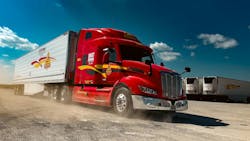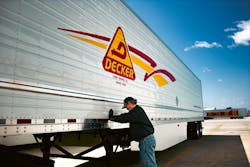Even for someone with a lifetime of experience in the trucking industry, this is a unique period.
“We’re facing a number of headwinds at the same time,” Dale Decker, CEO of The Decker Companies Inc., said. “The current freight market, the impact of supply chain issues over the past few years on equipment availability, upcoming emissions standards, and economic factors that affect new and used truck and trailer pricing are simultaneously changing how we approach business decisions.”
For Decker, typical equipment replacement and buying patterns have been upended. “It’s counterintuitive,” he explained. “The freight market continues to be tough on revenues, but we need to invest in new equipment at a time when truck prices are increasing and are projected to go even higher when 2027-compliant engines are in production. At the same time, used-asset resale values have fallen.”
“In addition, dealers are already talking about OEM allocation plans for 2025 and 2026 models and telling us we should be planning now with multiyear orders,” Decker continued. “Their message is that we need to place orders this year if we expect to get allocation slots in 2025.”
On the trailer side of the Decker Truck Line fleet, Decker noted that used pricing is down, and with longer trade cycles for power units, the issue of new-vehicle availability is not as critical. For the company’s refrigerated operations, the question is how much of the fleet needs to be CARB-compliant to operate in California.
Decker Truck Line offers temperature-controlled, dry van, and flatbed freight services. Headquartered in Fort Dodge, Iowa, the company operates 800 tractors and nearly 1,400 trailers from six terminals in Alabama, Indiana, Iowa, and Montana.
With nationwide and diversified operations, Decker is always looking to recruit and retain drivers. He noted that the carrier’s 70% annual turnover rate is well positioned compared to industry averages, but there are still opportunities to improve retention.
“We went from hiring drivers everywhere we could to focusing on finding candidates in our freight lanes,” Decker said. “Matching freight networks with driver domicile locations helps us find better candidates because we can get them home more often. It also means we don’t have to broker loads to minimize the amount of deadhead miles we run.”
See also: Decker Truck Line expands in-cab offerings
Decker also views competitive pay and benefits packages and premium equipment as effective recruiting and retention tools. He pointed out that the company's trucks are equipped with various comfort and convenience items, as well as the latest safety features.
In addition, Decker Truck Line has provided EpicVue in-cab TV for the past four years and is currently upgrading to the EpicVue+ platform, which adds online training and a dedicated fleet channel for distributing company announcements and fleet news.
“Interpersonal communication with drivers, who make up the majority of our workforce, is difficult in this industry,” Decker said. “We’ve had great success with satellite TV as a recruiting, retention, and driver comfort tool, and now we’re looking forward to using EpicVue+ to enable an even better relationship with our drivers.”
Decker Truck Line also anticipates savings by using EpicVue+ to exchange information instead of using tablet data plans. The company will eliminate the cost of those plans by using the Verizon network platform as a single system for operational data and communication and by giving drivers access to in-cab Wi-Fi.
Management systems are driving operational improvements at Decker Truck Line as well. As a long-time user of the McLeod Software TMS for truckload carriers, the company has also enabled integrations with other systems to provide greater visibility into its operations and streamline business processes.
One of those is a freight mapping tool. “In line with our strategy of matching drivers to freight networks, we’re also making decisions about loads based on how they fit with our operations,” Decker explained. “By matching shipper freight volume with our equipment, we can more effectively price loads and determine if they’re profitable. Across the board, that yields improvement and enhances our freight network’s efficiency.”
Running a family owned and operated company that has been in business since 1931 gives Dale Decker a highly informed view of the freight market. Today, he’s using that experience to make effective decisions to meet a number of challenges.
About the Author

Seth Skydel
Seth Skydel, a veteran industry editor, has more than four decades of experience in fleet management, trucking, and transportation and logistics publications. Today, in editorial and marketing roles, he writes about fleet, service, and transportation management, vehicle and information technology, and industry trends and issues.

